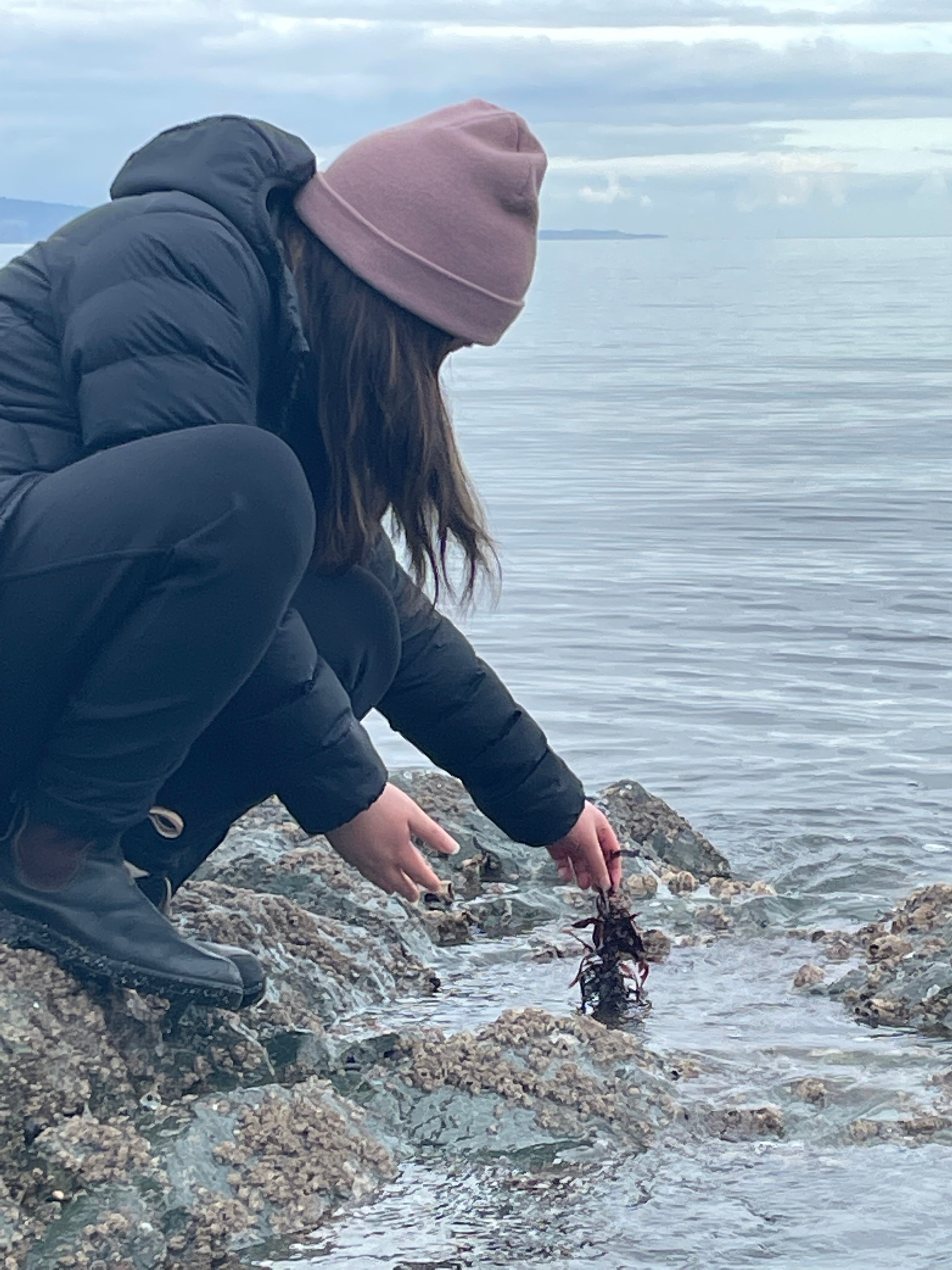Kelly Zheng has a lot on her plate. She's an engineering doctoral student at the University of Waterloo who is building a startup while also working towards a graduate business degree. It can be a balancing act, but she's tackling it all.
Her PhD research in quantum machine learning for spatial temporal modeling can be difficult for many to wrap their heads around. This emerging, quantum-based branch of AI and machine learning allows large data sets to be analyzed in a fraction of the time that a regular computer can manage.
That work has been noticed. Zheng was awarded the prestigious Natural Sciences and Engineering Research Council of Canada's doctoral research scholarship. There are many possibilities for application of this research, but Zheng is interested in how it could positively impact the world. Taking technological tools and putting them into hands that could benefit communities is what really drives her.

Kelly Zheng examines seaweed on Canada's west coast during her doctoral research.
Her supervisors, mechanical and mechatronics engineering professors Dr. Roydon Fraser and Dr. Jesse Thé, gave Zheng the support she needed to think about commercializing her research. And when she read about the Entrepreneurial PhD Fellowship, Zheng started to piece together how she could accomplish her goals.
"The knowledge that my supervisors were in my corner was a big reason that I felt comfortable to dream big," she said.
As a recipient of one of 10 fellowships offered to students across campus, Zheng is able to gain business knowledge, skills and experience to help commercialize her research. The fellowship allows Zheng to take the Master of Business, Entrepreneurship and Technology (MBET) program part-time and tuition-free at the Conrad School of Entrepreneurship and Business, while she also works on her doctoral studies. At the same time, she is building a new venture, Coastal Carbon, with co-founder Thomas Storwick.
Planting seaweed in oceans is an effective way of sequestering carbon and can in fact be many times more effective than tree planting. Companies can reduce their carbon footprint by purchasing carbon offsets such as seaweed planting, but there's a problem.
Coastal farmers who sell carbon offsets need to prove that the seaweed has been planted and is growing. Traditionally, this is done by sending divers into the ocean to physically measure the seaweed - a costly and often inaccurate method.
Measuring seaweed with a few mouse clicks
This is where Coastal Carbon comes in. Using satellite AI technology to measure trees on land is relatively straightforward, but measuring plant growth under water's reflective surface is much trickier. Zheng is using the past three years of her PhD research to provide a solution that allows clients to measure seaweed with just a few clicks of a mouse, saving time and money.
After only a few months, Coastal Carbon has won multiple start-up awards and pitch competitions, received funding from Up Start, a Velocity program for commercializing research, and has eight active pilot projects. Zheng attributes the trajectory of Coastal Carbon in large part to what the Entrepreneurial PhD Fellowship has allowed her to do.
"The support Coastal Carbon has received from Conrad staff, faculty and advisors has significantly accelerated our progress," she said. "Course content, from finance and accounting to leadership and strategic advice, have been directly applicable in our day-to-day operations."
Zheng hasn't just benefited from the hard skills that are taught in MBET. Interacting with others in the program has also brought a richness to her experience.
'A really edifying experience'
"What I didn't expect was how much impact the interactions with fellow classmates would have on me," she said. "I've met people who come from all kinds of careers and educational backgrounds and those casual conversations have allowed me to see what we're trying to do with Coastal Carbon from so many different perspectives. Many have become good friends and great resources for our company."
On a personal level, balancing the demands of a startup, doctoral degree and a master's degree at the same time concerned Zheng at first.
"I was worried about the added demand of MBET in terms of time and course load," she said. "However, the layout of the program accounts for doctoral study, and the Conrad staff and faculty have been nothing but supportive of the demands on our time. It's been a really edifying experience so far. I'm looking forward to the next couple of years in the program."






